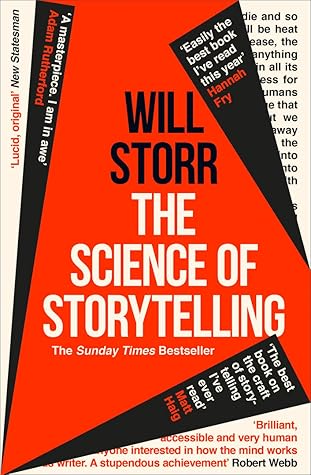More on this book
Community
Kindle Notes & Highlights
‘Other universal themes include falling from a great height, drowning, being lost or trapped, being naked in public, getting injured, getting sick or dying, and being caught in a natural or manmade disaster.’
Jane gave a Kitten to her Dad – is more effective than the ditransitive – Jane gave her Dad a kitten. Picturing
No single part of the brain is responsible for such story making. While most areas have specialisms, brain activity is far more dispersed than scientists once thought. That said, we wouldn’t be the storytellers we are if it wasn’t for its most recently evolved region, the neocortex. It’s a thin layer, about the depth of a shirt collar, folded in such a way that fully three feet of it is packed into a layer beneath your forehead. One of its critical jobs is keeping track of our social worlds. It helps interpret physical gestures, facial expressions and supports theory of mind.
‘Any scene which does not both advance the plot and standalone (that is, dramatically, by itself, on its own merits) is either superfluous or incorrectly written,’ he wrote. ‘Start, every time, with this inviolable rule: the scene must be dramatic. It must start because the hero has a problem, and it must culminate with the hero finding him or herself either thwarted or educated that another
between them, and not an “and then”.’ Brains struggle with ‘and then’. When one thing happens over here, and then we’re with a woman in a car park who’s just witnessed a stabbing, and then there’s a rat in Mothercare in 1977, and then there’s an old man singing sea shanties in a haunted pear orchard, the writer is asking a lot of people.
deeper parallel process is going on. Stevens is changing. His model of the world is slowly and painfully breaking apart.
understand Lester to be. We see Angela in a new way too. In all great stories, each major character is altered somehow by their interpersonal encounters. As they clash, they send each other spinning outwards, only to clash again in new and altered ways, and then spin out again, and meet again and so on and so on, out across the plot, in an elegant and gripping dance of change.
Booker writes, a ‘hero and heroine must represent the perfect coming together of four values: strength, order, feeling and understanding.’
a thing? What could make me? Great storytelling, like great psychology and great neuroscience, is a deep investigation into human behaviour.
means imagining that event thoroughly, then deciding what flawed belief about the world or themselves it generated. Once the writer knows when it happened, how it happened and what flawed concept the incident created, their character can more easily come alive in their imagination. The
‘What we ask of the theatre is the spectacle of a will striving towards a goal.’
psychologist and story theorist Professor Jordan Peterson talks of the mythic trope in which a hero makes final battle with a dragon that’s hoarding treasure. ‘You confront it in order to get what it has to offer you. The probability is that’s going to be intensely dangerous and push you right to the limit. But you don’t get the gold without the dragon. That’s a very, very strange idea. But it seems to be accurate.’
move beyond cliché requires precision. The writer must zoom in on a specific part of this deathless world


